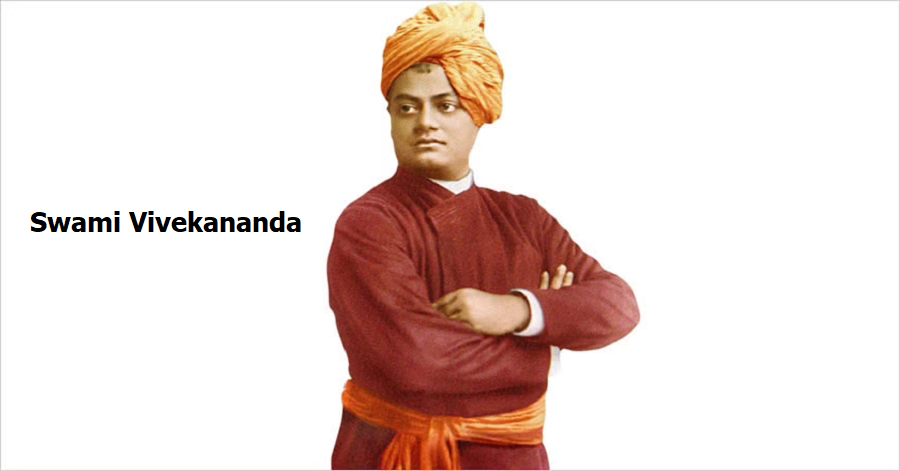
Swami Vivekananda was born in 1863 AD in Calcutta. His earlier name was Narendra Nath Dutt. He was a brilliant student since childhood. His principal Hastry said about him, "I have traveled to different countries of the world, but in my teens I could not find a young man of equal ability and great abilities in a German university."
Swami Vivekananda reached Dakshineswar on the inspiration given by Mr. Hastry. In the same temple he met Ramakrishna Paramhansa. Swamiji interviewed him. This interview was a unique event in his life. Swamiji got satisfaction from the answers of Ramakrishna Paramhansa.
When Narendra Nath went to see his Guru for the second time, he felt divine power. Narendra ji stayed in contact with Ramakrishna Paramhans ji for 6 years and after getting spiritual knowledge went from Narendra to Swami Vivekananda.
Swami Ramakrishna Paramahansa died in 1886 AD. Swami Vivekananda established the Ramakrishna Mission in memory of his guru and propagated the aims of Vedanta given by him throughout life among the people of Asia, Europe, and America. In short, Swamiji spread the greatness of Hinduism by propagating emotional Vedanta in western countries and functional Vedanta in India.
He also campaigned for universal brotherhood in his last days. Swami Vivekananda died in the year 1902.
Life Philosophy of Swami Vivekananda:
The life philosophy of Swami Vivekananda is very proud and inspirational for human beings. He told that life is a struggle. In this struggle only the capable are victorious and the incapable are destroyed.
Therefore, in order to survive by winning, every person should fight with every challenge of life. Swamiji used to feel very sad to see the sufferings of the then Indian people. One day he said that today we have become humble. We do everything out of fear of others.
It seems that we have been born in the land of enemies and not in the land of friends. In the vein of Swami Vivekananda, Indian and spirituality were full of code. Therefore, the basis of his education philosophy also remained Indian Vedanta and Upanishad. He used to say that the soul resides in every living being. Recognizing this soul is religion. Swamiji firmly believed that all general and spiritual knowledge lies in the mind of man.
Swamiji used to say that a person does not teach another person, but he himself learns. The external teacher only offers suggestions. Due to which the inner teacher gets inspiration to explain and teach.
Swamiji has said that we consider a person educated who has passed some examinations and who can give good speeches, but the reality is that education which cannot prepare the common man for life struggle, which is not character building. What is the benefit of such education by not developing the spirit of a social worker.
Education Philosophy of Swami Vivekananda:
Just as Swamiji's philosophy of life is detailed and realistic, so is his philosophy of education. He was critical of the current education system and was a strong supporter of contemporary education. He believed that education does not commit man to the struggle for life, but makes him powerless. He himself said in his philosophy of education
"We need an education by which character is formed, the strength of the mind is increased, the intellect is developed and man can stand on his own feet."
Basic Principles of Swami Vivekananda's Philosophy of Education:
Following are the basic principles of Swami Vivekananda's philosophy of education:
1) Swami Vivekananda ji says that children should not be given knowledge only because studying books is not education.
2) Knowledge exists in the mind of a person, he learns by himself.
3) Mind is pure soul control of word and deed.
4) Education develops the child physically, mentally, morally, and spiritually.
5) Education should form the character of the child, the strength of the mind should be large and the intellect should be developed so that he can stand on his feet.
6) Both boys and girls should get equal education.
7) Women should be given special religious education.
8) Education should be promoted among the general public.
Objectives of Education according to Vivekananda:
1) Aim to Achieve Perfection:
According to Swamiji, the first aim of education is to achieve inherent perfection. According to him, all the worldly and spiritual knowledge is already present in the mind of man.
2) Objective of physical and mental development:
According to Vivekananda, the second aim of education is the physical and mental development of the child. He emphasized on physical purpose so that today's children can progress in future by studying Gita as a fearless and strong warrior. Emphasizing on the mental objective, he said that we need such education, by which man can stand on his own feet.
3) Objectives of Moral and Spiritual Development:
Swamiji believed that the greatness of a country does not come from its parliamentary work alone, but from the greatness of its citizens. But to make citizens great, their moral and spiritual development is absolutely necessary.
4) Purpose of Character Building:
Vivekananda considered character building as an important objective of education. For this, he stressed on following Brahmacharya and told that intellectual and spiritual powers would develop in man through Brahmaacharya and that mind would become pure by word and deed.
5) Feeling of self-confidence, reverence and self-sacrifice:
Swamiji emphasized throughout his life that having faith in oneself, developing the spirit of faith and self-sacrifice is the most important aim of education. He wrote, Arise, awake and keep on moving till that time the ultimate objective is not achieved.
6) Objectives of Religious Development:
Swamiji considered religious development as the main aim of education. He wanted everyone to know the truth or dharma that is ingrained in him. For that, he laid emphasis on training of mind and heart. And told that education should be such that by getting it children can make their life holy.





